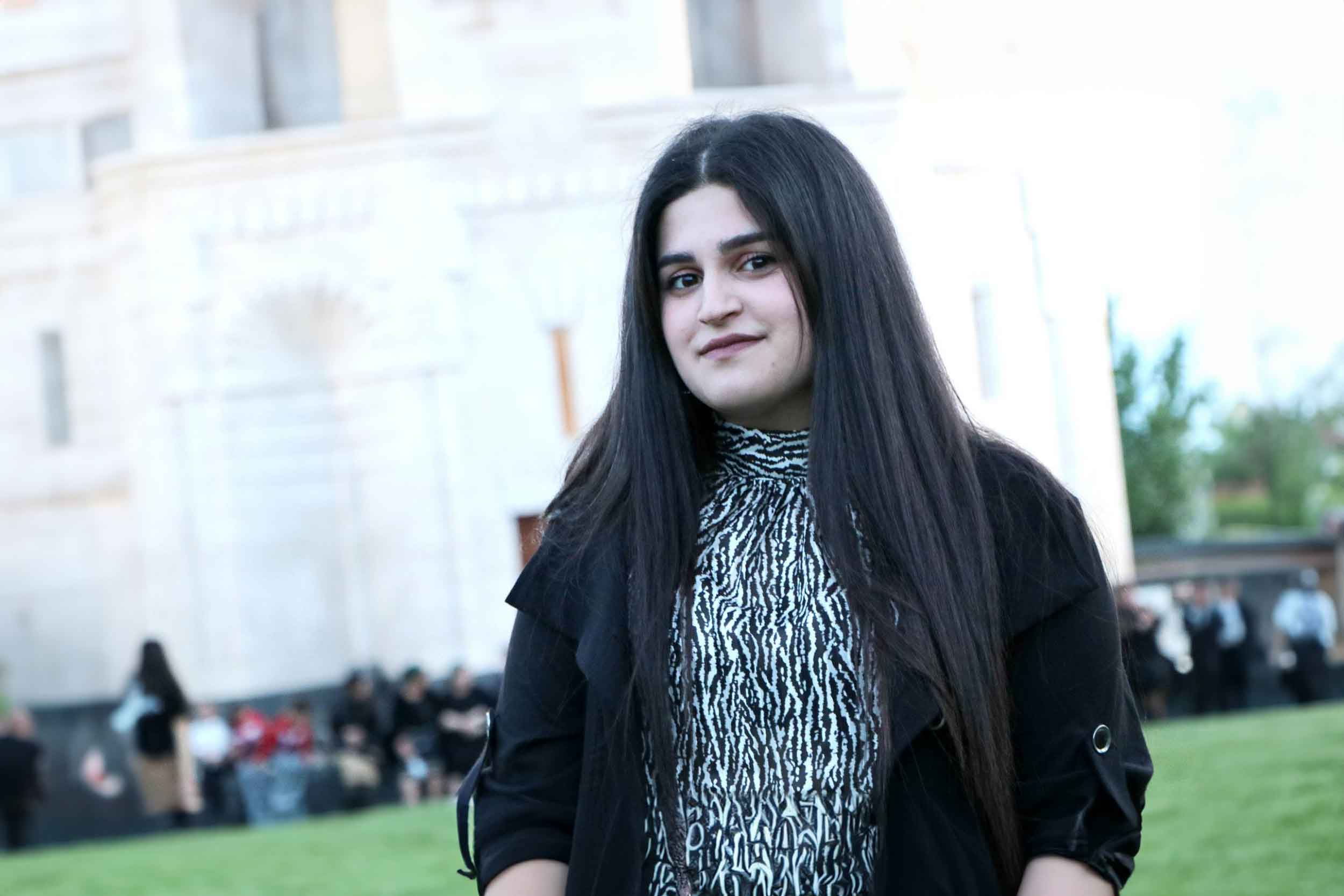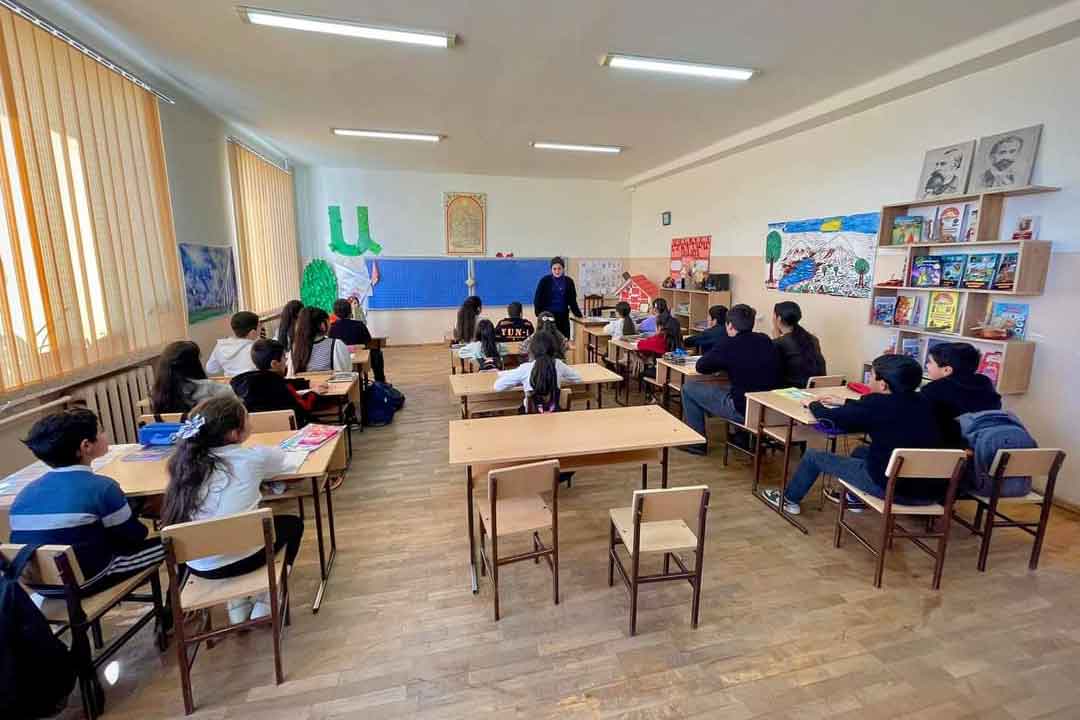Armenia’s Yezidi Girls Choose School Over Early Marriage
Despite conservative social norms that mean girls can wed as young as 14, drop-out rates are declining.
Armenia’s Yezidi Girls Choose School Over Early Marriage
Despite conservative social norms that mean girls can wed as young as 14, drop-out rates are declining.
Lena Mirzoyan has always loved learning. Now 21, she recalls finding school a joy even though only a handful of girls in her Yezidi community of Gukasavan, a village of 2,300 people west of Yerevan, had ever graduated. None had gone on to further education.
“I have always wanted to enter university since I was little, but I had to confront the stereotypes existing in the Yezidi community where girls marry young,” Mirzoyan told IWPR. “My sister married at 16 and I was afraid to say that I wanted to get an education. She was a better student than me, she dreamt of studying medicine, but my father decided that she had to get married.”
A close-knit community practicing an ancient, monotheistic religion, the Yezidi are Armenia’s largest ethnic minority, numbering 35,272 individuals according to the 2011 census, although unofficial data set the community at about 45,000. The issue of early marriage is acute: conservative social norms mean that girls rarely finish school and can marry as early as 14.
Mirzoyan refused to give up on her studies, finding allies in her mother and her teacher. One wanted her daughter to fulfill the dream that she had to give up, the other supported her academically and financially.
Avoiding numerous marriage proposals, Mirzoyan first completed school then studied for and passed her university entry exam in secret. Once she was admitted, her teacher stepped in and paid for university fees.
“I am lucky because my teacher tried to do her best for my studies,” Mirzoyan continued. “She was even ready to go against my family just to have me admitted to university. She kept telling me, ‘You should make your dream come true.’”
Mirzoyan is now a sociology student at Yerevan State University.

TIMES ARE CHANGING
In April 2013, Armenia raised the minimum age for girls to marry from 17 to 18; marrying at 16 is still possible with the consent of the parents or legal guardians. Yezidi representatives claimed that the amendments to the family code violated their traditions.
University remains an unattainable dream for most young Yezidi, including boys, who finish high school in relatively larger numbers but are also pressured to drop out to work as farmers or shepherds.
Slowly but steadily times are changing. In the 2020-2021 academic year, of the 113 Yezidis who graduated from high school, just over a quarter - 29 - were girls. Two years later the number of Yezidi graduates rose to 133, of which 44 (31.1 per cent) were girls.
In parallel, the drop-out rate from school is decreasing. In 2020-2021, 52 Yezidi students left school before the end of the 12-year-cycle, of whom 26 were girls, but in 2022-2023 the number dropped to 14, including eight girls.
Similarly, the overall number of Yezidis studying in universities is on the rise. In 2017-2018, 29 - including just four girls - completed higher education. By 2022-2023 the number had risen to 40, of whom 14 were girls.
“These figures are not a good indicator for a community with about 38,000 people, but if we look at the growith, this is a positive trend,” said Muraz Shamoyan, president of the Yezidi Centre for Human Rights NGO and editor of the Yezidi XiratMedia. “Over the last 15 years, we have certainly seen positive developments… now more parents allow girls to complete at least nine years of school before marrying them at 16.”
Shamoyan argued that, while the community needed to strive for change, the state needed to play a more active role.
“Officials see early marriages and lack of education as an ‘internal issue’ of the Yezidi community’, while it should be addressed as a matter of [respecting the] law,” he noted.
Mirzoyan agreed that authorities and law enforcement bodies were reluctant to take action.
“When a 16-year-old Yezidi girl gives birth, no police officer or social worker comes and asks why…If she’d dropped out of school, no question is asked about why a Yezidi child does not attend school,” she said. “They believe that a Yezidi girl does not attend school because she is married and they turn a blind eye to the situation.”
This may be motivated by a wish to avoid ethnic controversies or harm Yezidis, but for Mirzoyan this inaction hurt the community more deeply.
“Yezidi parents may not be aware of why attending school is significant, but if they fear that authorities will take measures, they would stop getting their children married so young or deprive their children of their right to education,” she concluded.

NATIONAL MINORITIES
The government has no specific programmes to encourage higher education among the country’s communities.
“The Republic of Armenia’s education law is the same for teachers and students of all institutions with no national distinction,” Artur Martirosyan, deputy minister of education, sports and culture, told IWPR via email.
According to the 2011 census, ethnic minorities make up 2.9 per cent of the Armenian population. Since 2017, the country’s 105-seat parliament has four seats allocated to minorities, one each from the country’s Yezidi, Assyrian, Kurdish and Russian communities.
The data from 2022 showed a decline of the country’s population by 89,940 to 2,928,914, but details on ethnicity are not yet available.
In 2019, a draft law on ethnic minorities was submitted for public discussion, but four years on is still under revision. While minorities feature in various laws and regulations, Shamoyan argued that dedicated legislation was needed to ensure their rights.
These included protection of the Yazidi national language, Kurmanji, also known as Northern Kurdish.
For Yezidi lawmaker Rustasm Bakoyan the dire shortage of qualified Yezidi language specialists was an indication that “the instruments aimed at protecting the rights of national minorities are ineffective”.
Mirzoyan, who teaches the Yezidi language and is actively engaged with girls in her community, has proved an inspirational figure. She was the first to go to university in her village: since her enrollment, two other girls have followed her example.
“People need inspiring success stories to take bold steps, [examples that make them] believe they can also set on the same path and succeed,” she explained.
Now in her third year of studies, Mirzoyan dreams of creating a development centre for Yezidi women and girls, but remains acutely aware of the obstacles she may face.
“The elders of our family, in particular grandparents, are stressed because I am not married. They have never seen a Yezidi girl still unmarried at 21; many people have not,” she said, adding that her father has promised she will not need to marry until she gets her degree.
This publication was prepared under the "Amplify, Verify, Engage (AVE) Project" implemented with the financial support of the Ministry of Foreign Affairs, Norway.
